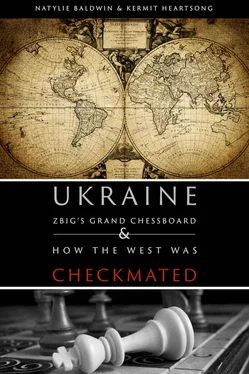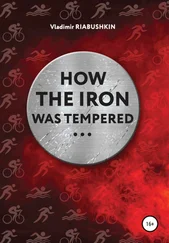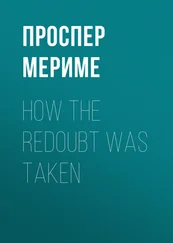Kermit Heartsong - Ukraine - ZBIG's Grand Chess Board & How The West Was Checkmated
Здесь есть возможность читать онлайн «Kermit Heartsong - Ukraine - ZBIG's Grand Chess Board & How The West Was Checkmated» весь текст электронной книги совершенно бесплатно (целиком полную версию без сокращений). В некоторых случаях можно слушать аудио, скачать через торрент в формате fb2 и присутствует краткое содержание. Год выпуска: 2015, Жанр: Политика, на английском языке. Описание произведения, (предисловие) а так же отзывы посетителей доступны на портале библиотеки ЛибКат.
- Название:Ukraine: ZBIG's Grand Chess Board & How The West Was Checkmated
- Автор:
- Жанр:
- Год:2015
- ISBN:нет данных
- Рейтинг книги:4 / 5. Голосов: 1
-
Избранное:Добавить в избранное
- Отзывы:
-
Ваша оценка:
- 80
- 1
- 2
- 3
- 4
- 5
Ukraine: ZBIG's Grand Chess Board & How The West Was Checkmated: краткое содержание, описание и аннотация
Предлагаем к чтению аннотацию, описание, краткое содержание или предисловие (зависит от того, что написал сам автор книги «Ukraine: ZBIG's Grand Chess Board & How The West Was Checkmated»). Если вы не нашли необходимую информацию о книге — напишите в комментариях, мы постараемся отыскать её.
Ukraine: ZBIG's Grand Chess Board & How The West Was Checkmated — читать онлайн бесплатно полную книгу (весь текст) целиком
Ниже представлен текст книги, разбитый по страницам. Система сохранения места последней прочитанной страницы, позволяет с удобством читать онлайн бесплатно книгу «Ukraine: ZBIG's Grand Chess Board & How The West Was Checkmated», без необходимости каждый раз заново искать на чём Вы остановились. Поставьте закладку, и сможете в любой момент перейти на страницу, на которой закончили чтение.
Интервал:
Закладка:
Of course, no one in their right mind believes this is what would transpire.
In February of 2008, Ambassador Burns sent a classified cable back to Washington summing up a meeting with Foreign Minister Lavrov about Ukraine’s intent to seek a NATO Membership Action Plan as “Nyet Means Nyet: Russia’s NATO Enlargement Redlines.” The Russians had reiterated again that Ukraine in NATO was unacceptable, citing among other concerns, that the issue could precipitate division in the country, perhaps leading to civil war, which would put Russia in the difficult position of having to choose whether to intervene or not — a decision it was stressed that Russia did not want to be faced with (Burns 2008).
Furthermore, Ukrainians themselves demonstrated their antipathy toward NATO membership from January to March when the Ukrainian parliament (the Verkhovna Rada) was blocked from functioning by an opposition coalition that resulted from the “Orange Revolution” leaders Viktor Yushchenko and Yulia Tymoshenko trying to push the country into the alliance (Rozoff 2014).
The geopolitical reality is that Ukraine needed to be a buffer and a bridge between the West and Russia with the opportunity to have beneficial economic relations with both, since Russia has been Ukraine’s largest trading partner and the country from which it received various subsidies, such as discounted gas. To ensure that buffer role, however, it was imperative for all parties that NATO membership was off the table.
Despite denials in some quarters, the economic agreement with Europe that deposed Ukrainian President Viktor Yanukovych refused to sign included language that would lay the groundwork for NATO membership (Stea 2013). This presented another serious problem in addition to the economic exclusivity and austerity program, it would have required of an already poor country that relies heavily on trade with Russia. While Yanukovych may have been playing both ends against the middle with Russia and the EU, it was certainly not irrational for him to have rejected the terms of this agreement.
As Stephen Cohen stated in a June 2014 interview with Thom Hartmann, no country anywhere in the world, regardless of their leader, would allow an adversarial military alliance to park itself on their borders. It would be considered an act of aggression (Hartmann 2014).
During the Franco-Russian roundtable dialogue on the Ukraine crisis, the participants acknowledged the contribution of NATO and its dynamics to the current problems:
The position of the European Union is held hostage by certain countries, especially Poland, who are doing nothing for the resolution of this crisis….[They described] what was now happening as a “cycle of stupidity”, in which some, particularly in the EU and NATO, bear a heavy and historical responsibility.” (Slavyangrad 2014)
chapter 4
Post — Soviet Russia
From “Shock Therapy” to an Emerging Power
The result [of Boris Yeltsin's “shock therapy” program] was the worst economic and social catastrophe ever suffered by a major nation in peacetime. Russia sank into a corrosive economic depression greater than that of the American 1930s. Investment plunged by 80 percent, GDP by almost 50 percent; some two-thirds of Russians were impoverished; the life expectancy of men fell below 59 years; and the population began to decline annually by almost a million people. In 1998, with nothing left to sustain it, despite several large Western loans, the Russian financial system collapsed. State and private banks defaulted on their domestic and foreign obligations, causing still more poverty and widespread misery.
— Stephen F. Cohen, Soviet Fates and Lost Alternatives (Cohen 2011)
Ambassador Matlock described conditions in the aftermath of the Soviet dissolution as follows: “In Russia, the Soviet collapse was followed by runaway inflation that destroyed all savings, even worse shortages of essential goods than existed under communism, a sudden rise in crime, and a government that, for several years was unable to pay even [its] miserable pensions on time. Conditions resembled anarchy much more than life in a modern democracy” (Matlock 2010).
When the communist command economy was dismantled, Neoliberal economic advisors often insisted that Russians not rely on the state for any economic assistance during the transition under the guise of leaving communism behind. One illustrative story relayed by Matlock involved a member of the Moscow city council who wanted to encourage small private businesses in his district. He had developed a plan to “offer long-term low-interest loans from the city budget to entrepreneurs…When he explained his idea the Hoover (Institution) economists objected, saying that he must not involve the government…If the government provided loans or subsidies, that would be perpetuating socialism” (Matlock 2010).
The city council member was taken aback and asked where entrepreneurs would get their seed capital. After being told that it would have to come from private sources, he inquired, “You mean from our criminals? If they provide the capital, they control the business. That’s not what we want to happen” (Matlock 2010).
Unfortunately, that is what happened.
Exploitive conditions were foisted on Russia when economic advisors from the Harvard Institute for International Development and other advocates of the “Chicago School” of economics colluded with Russian predators like Anatoly Chubais, Mikhail Khodorkovsky and others who would emerge as Russia's pack of oligarchs (Wedel 1997).
In the meantime, Russians were excited at the new possibilities of the democratic transformation they were undertaking. However, the dissolution of the Soviet Union, which had held together numerous republics that consisted of various ethnic groups and had provided a modest but stable livelihood for most, also resulted in destabilization and trauma. Russians tried to learn how to form and navigate democratic institutions and move toward a privatized economy, yet had no meaningful experience with either in their long history of authoritarian rule, the last 70 years of which constituted a closed totalitarian state.
Sharon Tennison, an American author, citizen diplomat and founder of the Center for Citizen Initiatives who has worked all throughout Russia (and its predecessor the Soviet Union) since 1983, captured the hopes, fears and confusion of Russians during this harrowing time when she relayed a conversation she had with a Russian scientist named Tatiana in 1991:
We are not like Americans. We don’t have the natural instincts your people have cultivated for generations. We have another set of instincts, another mentality. It will take us a very long time….and it will be a very painful process for us to learn a new mentality. First, we will be flat on our stomachs for probably seven years, then we will have to hobble on our knees for probably seven more years, then maybe we will get on our feet in the next seven years. We don’t know — we can’t see what is ahead at the end of this black tunnel. It is a totally unknown future we are walking into. (Tennison 2012)
The Russians are a very smart, resilient, and resourceful people. But they also have a different ethic about the role of social and economic rights, a different geographic reality they are sensitive to — having been invaded numerous times in their history and possessing a strong memory of profound destruction and suffering from The Great Patriotic War (WWII) — and a more conservative cultural view due to the closed nature of the Soviet Union that even today is barely 23 years into the past. Therefore, as Russians embarked on their journey toward democracy and a new economic order — a journey that is still in progress — they could not be expected to become a carbon copy of the United States, or even of other European nations. They would need to find their own path consistent with their culture, geography, and history. This is part of the right of self-determination, a right that is often not respected by international players in powerful positions who must continuously feed an insatiable need for more profits, more markets, and more geopolitical power. The unfolding of events in post-Soviet Russia is a case in point.
Читать дальшеИнтервал:
Закладка:
Похожие книги на «Ukraine: ZBIG's Grand Chess Board & How The West Was Checkmated»
Представляем Вашему вниманию похожие книги на «Ukraine: ZBIG's Grand Chess Board & How The West Was Checkmated» списком для выбора. Мы отобрали схожую по названию и смыслу литературу в надежде предоставить читателям больше вариантов отыскать новые, интересные, ещё непрочитанные произведения.
Обсуждение, отзывы о книге «Ukraine: ZBIG's Grand Chess Board & How The West Was Checkmated» и просто собственные мнения читателей. Оставьте ваши комментарии, напишите, что Вы думаете о произведении, его смысле или главных героях. Укажите что конкретно понравилось, а что нет, и почему Вы так считаете.











